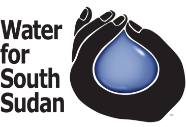The Impact: Water Wells
Access to clean water changes lives. As a result, our top priority is drilling water wells to provide clean, safe water for people and animals to drink.
How is a water well drilled?
The rig drills a borehole (also known as a water well) up to 300 feet deep into the Earth to the aquifer below to access the clean, fresh water. Stainless steel and PVC pipes are installed, and the space around the piping is sealed with sand, gravel, and bentonite to prevent contamination from the surface. A hand-operated pump and an above-ground cement platform are installed to keep the well secure.
How long does it take to drill a water well?
Drilling a new well takes three to seven days, but months of planning are required before arriving in the village. Our team receives approval from the government of South Sudan after sharing their plan to drill in specific sections of the country. Once approved, they visit communities to complete assessments and meet with village elders. The village elders are tasked with deciding where the new well will be drilled, ensuring ownership of the well. Community buy-in is key to guaranteeing sustainable projects.
Once locations are deemed suitable, the team travels to communities. It requires community members to participate in every aspect of the drilling process: removing debris, digging pits to hold water used during the drilling process, scooping sand and gravel, and even a volunteer cook to support providing food for the team. Once the well is complete, 1-2 community members are trained on essential well maintenance to ensure they can make necessary repairs.
Lastly, we test the water for safety before leaving the well in the community’s care. While it is mostly clean from natural sand and rock filtration (given the underground aquifer's depth), we sanitize the well with chlorine if we find contamination.
How much water can a well produce per day?
Each well pumps about 1,800 gallons per day and serves approximately 500 to 1,000 people. The impact of these wells is significant. Villages get clean, fresh water for cooking, cleaning, and washing, which greatly improves health and quality of life.
Together, we are uniting to water the seeds of change in South Sudan. Thank you for supporting this invaluable work.









